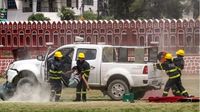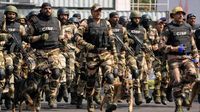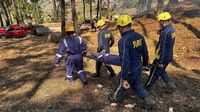India is gearing up for a nationwide civil defence mock drill scheduled for Wednesday, May 7, 2025, in response to heightened tensions with Pakistan following a recent terrorist attack in Pahalgam that resulted in the deaths of 26 people. The Ministry of Home Affairs has directed all states and Union Territories to participate in this exercise, which will span across 259 locations nationwide.
The drill aims to test the country’s preparedness for potential hostile attacks and will involve activities such as air raid warning tests, blackout protocols, and evacuation rehearsals. This initiative comes amid ongoing cross-border tensions and is designed to ensure that civilians are equipped to respond effectively in emergency situations.
The mock drill will take place in key states, including Uttar Pradesh, Odisha, West Bengal, Jammu and Kashmir, Punjab, Rajasthan, Himachal Pradesh, and Gujarat. Over 100 locations identified as highly sensitive will be included in the exercise, emphasizing areas with significant infrastructure and potential targets.
According to officials, the drill will focus on several critical activities. These include testing air raid warning systems, practicing blackouts, and checking emergency response systems in both urban and rural areas. A civil defence official explained that air raid sirens serve as the first warning signal during a crisis, making their functionality crucial.
As part of the drill, participants will engage in various scenarios that simulate real-life emergencies, including evacuation procedures and communication checks with the Indian Air Force (IAF). The drill will also involve training civilians on civil defence measures to protect themselves in case of a hostile attack.
In preparation for this nationwide event, civil defence volunteers have already conducted rehearsals across various cities. In Lucknow, for example, volunteers practiced responding to fire emergencies and rescuing individuals who might suffer injuries during a crisis. The rehearsals included sounding air raid sirens, prompting participants to lie flat on the ground and cover their ears, simulating the response needed during an actual attack.
The significance of these mock drills cannot be understated. They represent a proactive approach to national security, particularly given the historical context. The last time India conducted widespread civil defence drills was during the lead-up to the Indo-Pakistani War in 1971, a time when the country mobilized civilians for potential wartime scenarios.
Back in 1971, extensive preparations were made, including blackout drills where citizens turned off all lights to avoid detection by enemy aircraft. The drills were comprehensive, involving coordination between military and civilian agencies, and aimed at ensuring public readiness for potential threats. This historical precedent underscores the seriousness of the current geopolitical climate.
As tensions escalate following the Pahalgam attack, which has been linked to cross-border terrorism, the Indian government is emphasizing the need for heightened vigilance. Prime Minister Modi has publicly stated that those responsible for the attack will face justice, reflecting the urgency of the situation.
In light of the upcoming drills, citizens are being advised to prepare by keeping essential items handy, such as medical kits, torches, candles, and cash, to ensure they are ready for potential electronic failures during a crisis. The government has confirmed that essential services, including hospitals and emergency response teams, will remain operational throughout the mock drills.
Despite the scale of the exercise, officials have assured the public that daily life will continue without significant disruption. Schools and colleges are expected to remain open, and public transport systems will operate as usual. However, residents may experience minor inconveniences, such as temporary road closures or traffic snarls as authorities conduct the drills.
Moreover, security has been intensified in major cities, including the national capital, in anticipation of the drills. Police patrols have been increased, particularly in tourist hotspots and marketplaces, to ensure safety and order during the exercise.
Participants in the mock drill will include civil defence wardens, home guards, National Cadet Corps (NCC) members, and volunteers from various organizations. This collective effort aims to foster a sense of community preparedness and resilience against potential threats.
As the world watches the evolving situation between India and Pakistan, the upcoming civil defence mock drill serves as a reminder of the importance of readiness in the face of uncertainty. The exercise not only prepares the nation for emergencies but also reinforces the commitment to safeguard its citizens in challenging times.
In summary, the nationwide civil defence mock drill on May 7 is a crucial initiative aimed at bolstering India's preparedness against potential attacks, particularly in light of recent events. With a focus on training civilians and testing critical systems, this exercise underscores the nation's proactive stance in ensuring safety and security for all.






